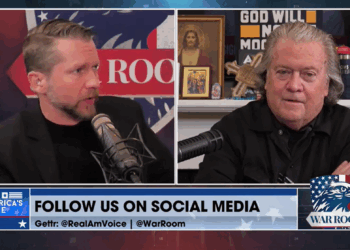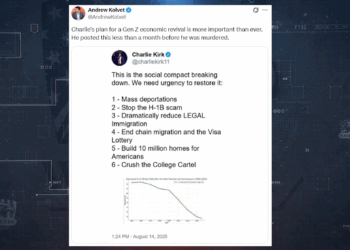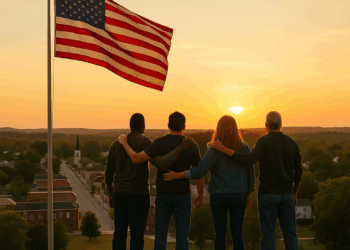Mark Mitchell’s Wednesday WarRoom report — a blunt, sometimes brutal tour through Reddit’s underbelly and the online currents that feed political violence — reads like a warning flare. Speaking with Steve Bannon, Mitchell stitches together three threads: the normalization of violent "direct action” in fringe channels, the mass cultural sway of platforms like Reddit, and the generational frame known as the Fourth Turning.
The result is not an academic treatise; it’s a call to acknowledge what has happened while institutions looked the other way.
Here are the main numbers Mark Mitchell cited, from his polling work, in that conversation with Bannon:
69% – "very concerned” about political violence in America.
21% – "somewhat concerned.”
→ Together, that’s 90% of Americans concerned (Mitchell said he’d never seen a 90-handle on any issue before).
74% of Democrats – "very concerned.”
66% of Republicans – "very concerned.”
→ Both parties combined: about 90% concerned across the board.
48% – believe more political violence in the next few months is very likely.
37% – believe it’s somewhat likely.
→ Roughly 85% total expect more political killings soon.
87% of Democrats and 87% of Republicans – say more political violence is likely.
Only 1% – say it’s not at all likely there will be more political killings.
86% – agreed with Trump’s statement blaming media demonization for fueling violence.
Mitchell emphasized that these are extraordinary numbers — bipartisan, overwhelming, and a signal that the public sees the system breaking down, which he links to the "Fourth Turning” cycle.
Here are the Trump approval and "right direction” numbers that Mitchell gave alongside the political violence stats:
-
When Trump was elected in 2016, "right direction” numbers shot up — Mitchell said it was the highest in their polling history.
-
He noted that it stayed at around 40% (which he described as "record-breaking”), far above typical baseline numbers.
-
Before Trump, the longest positive streak they’d ever measured was seven weeks in a row.
-
During Trump’s first term, that streak was broken multiple times — showing Americans were unusually optimistic compared to historic polling patterns.
Mitchell tied this optimism to the sense that Trump’s election "lifted a weight” off people — not just Republicans, but independents and disaffected citizens who "wanted their government back” and a return to normalcy.
So in summary:
-
Violence polling: ~90% concerned, ~85% expect more killings, ~86% agree rhetoric/media is to blame.
-
Trump optimism polling: record-breaking "right direction” numbers (around 40%), longest positive streaks ever, showing a broad shift in national mood.
Mitchell’s central claim to Bannon on Wednesday is straightforward: large corners of the internet have become recruitment and radicalization pipelines. He pulls examples from Reddit threads where users explicitly applaud violence and even celebrate assassinations as "direct action.” Those signals, he argues, aren’t isolated chatter but feedback loops — upvoted rhetoric that morphs from talk to tactical suggestion, then spreads to other platforms. When moderators and platform owners act unevenly or in ways that favor one political current, the effect is cultural displacement. Young users, arriving on those sites curious about hobbies or politics, are sometimes funneled into radical subcultures whose norms drift toward militancy.
That’s where the Fourth Turning frame enters. Mitchell — prompted by Bannon — leans on Strauss and Howe’s theory that history cycles through four moods, culminating periodically in a crisis-era "fourth turning” that breaks old orders and forces society to rebuild. This is shorthand for the sense many feel: that institutions are failing, trust is plunging, and when people believe systems are irreparably corrupted, some will turn to extra-legal remedies. The Fourth Turning idea helps explain why Mitchell and Bannon view online radicalization not as random pathology but as one symptom of deeper civic rot.
Mitchell ties those big-picture notions to concrete failures: intelligence priorities that miss online ferment; anonymous moderation that can enforce ideology rather than neutral rules; and corporate ownership stakes that, in his view, create incentives to suppress or amplify particular communities. He’s not shy about calling this "election interference” when platforms throttle a mass political community. Whether you accept every causal link he asserts or not, the practical upshot is clear — if a forum with millions of young users tilts the cultural nets in one direction, it shapes future civic habits and political identities.
The chilling part of Mitchell’s message is the polling and public mood he cites: broad anxiety about political violence and a sense that routine institutions can’t or won’t defend citizens from ideological predation. That anxiety is fertile ground for the kind of decisive, often messy collective change the Fourth Turning predicts — and for opportunists who will try to steer that change.
For readers who want the essentials: Mitchell warns that radical rhetoric on mass platforms is not harmless venting; unchecked, it seeds real-world violence. He frames that danger within a generational crisis narrative — the Fourth Turning — where institutional collapse and cultural reordering make violent breakpoints likelier. The remedy implied isn’t a technocratic silence but a large-scale institutional reckoning: clearer platform governance, consistent law enforcement priorities, and a national conversation about how to rebuild trust before grievance morphs into action.
Mitchell’s story is provocative, sometimes scary, and deliberately confrontational. But whether you buy his numbers-by-line analysis or not, his core demand is reasonable: don’t ignore what’s growing in plain sight. If society is indeed in a decisive phase, silence and denial won’t protect us — they’ll make the next turning that much uglier.
For more context, watch this segment of Bannon’s interview with Mitchell:




